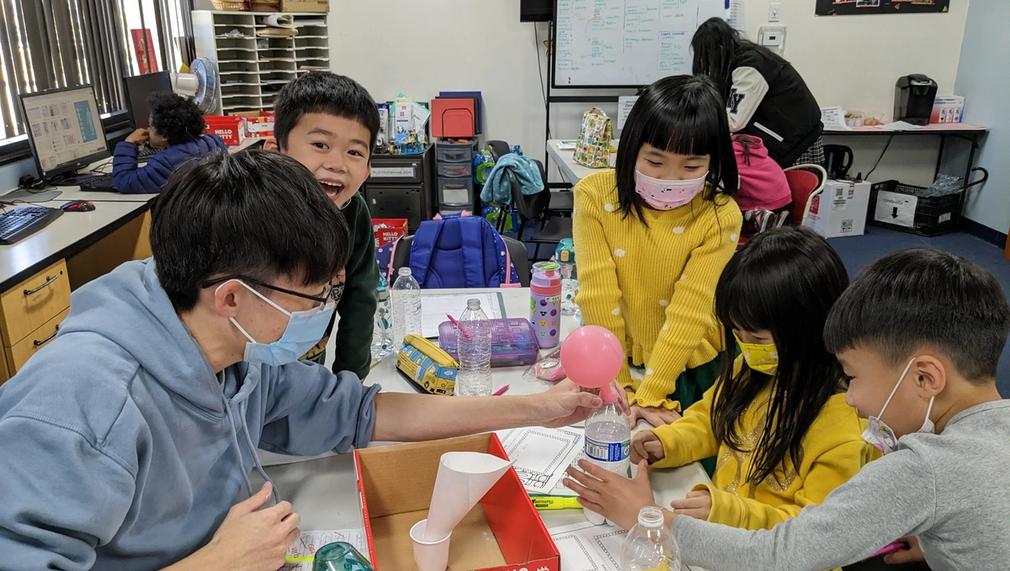Building Math & Science Foundations
Our goal is to present various approaches that will aid students in comprehending and demonstrating a deep interest in building both math and science foundations as career pathways they can pursue until they enter the workforce.
We would offer practical math and science activities in addition to academic instruction during class. Students will be able to apply the scientific method to their learning through play and experiments with the support of the designed activities to increase their interest and understanding in both Math and Science..

What is the primary issue area that your application will impact?
K-12 STEAM education
In what stage of innovation is this project, program, or initiative?
Pilot or new project, program, or initiative (testing or implementing a new idea)
What is your understanding of the issue that you are seeking to address?
Of the students we serve, the average grade in math and science is a C, respectively especially students who are immigrants or born of immigrant parents. They have limited English proficiency and make these students more difficult to understand math and science since their primary language is not English. For many students, these subjects have become boring and losing interest which result in the unwillingness of turning in homework and/not doing well in testing. Students are not able to depend on their parents to support them in learning both Math and English because they are limited in English. Chinatown Service Center wishes to interest our youth early on. We aims to engage the youth by providing small-group instruction in math and science, along with hands-on activities and classroom assignments. With the early exposure in these areas, we believe that these students will select high-quality career pathways such as forensic scientist, coding etc. when they enter college.
Describe the project, program, or initiative this grant will support to address the issue.
Our well-run Academic Mentoring Program, housed within CSC's Youth Center, offers year-round homework help, grade monitoring, high school internships, college preparation, youth volunteer opportunities, and academic advising to students in grades K–12. This grant's funding will help our Academic Mentoring Program incorporate math and science. Staff will design learning activities that are closely related to subjects taught in schools or to the subjects included in each grade's core competencies besides assisting them to fully understand their assigned math and /or science homework. Since many students do not have homework or have less homework on Fridays, we plan to implement hands-on math and science activities once a week on Fridays during the school year. Every day throughout the winter, spring, and summer breaks, there will be activities available. Among the math-related activities include solving math problems in relay format, solving puzzles, and playing logic games that call for mathematical reasoning. The science-related activities are building model rockets, exhibiting fascinating chemical reactions that change color, and going on field trips to science museums. Staff will explain after the activities how they relate to either science or math to increase their interest in both subjects.
Describe how Los Angeles County will be different if your work is successful.
The short-term goal of the program is to expose underserved, minority youth in Los Angeles to careers that required math and/or science. We hope to expand youth’s understanding of complex ideas, to promote critical-thinking, and to instill an appreciation of the subjects. The long-term goal of the program is to increase the number of minority youth who will attend college in pursuit of high education in those fields. More college graduates with math and/or science degrees will eventually lead to an expanded workforce in Los Angeles County. We believe that exposing underserved, minority groups at a young age, will ultimately create a qualified, passionate, and more diverse math and science workforce in the future. This will also bring educational equity to diverse, first and second-generation immigrant children.
What evidence do you have that this project, program, or initiative is or will be successful, and how will you define and measure success?
1) Improvements in math/science grades, as measured by report cards, from baseline to the end of the grant period. Our goal will be to achieve improvements for 75% of our students.
2) Identify students who are at high-risk for failing a math or science class, and perform targeting tutoring throughout the grant period. Of these targeted for intensive tutoring, 80% will improve their grade in math and/or science, as measured by report cards, from baseline to the end of the grant period.
3) Conduct 40 hands-on program activities for students throughout the grant, with participation of 5 or more students per activity and other activities such as forming math clubs and attending science fairs.
4) 70% of the students participating in the program will report the activities to be beneficial to their academic success through a survey.
Approximately how many people will be impacted by this project, program, or initiative?
Direct Impact: 40.0
Indirect Impact: 60.0